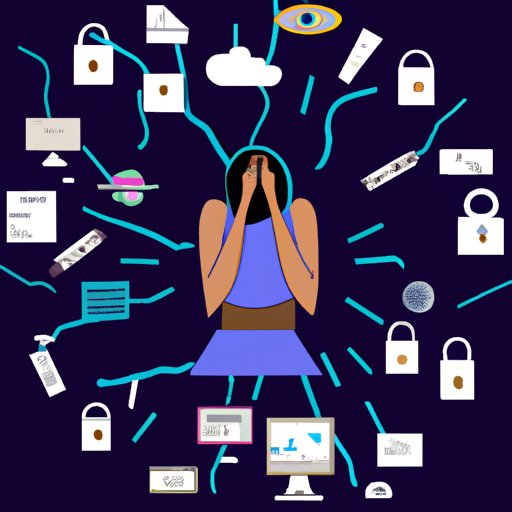Introduction
Technology has become an integral part of our lives in the 21st century. From computers and smartphones to smart homes and connected cars, technology is everywhere. While technology has enabled us to be more productive, connect with others, and access information quickly, it also has some negative impacts on our lives.
Increased Risk of Cybercrime
Cybercrime is defined as any crime that involves a computer or network-connected device. Common types of cybercrimes include identity theft, phishing scams, ransomware attacks, and data breaches. According to a 2018 study by the Ponemon Institute, the average cost of a data breach in the US was $7.91 million. In addition to financial losses, these cybercrimes can also lead to psychological distress and reputational damage.
To reduce the risk of cybercrime, it’s important to take security measures such as using strong passwords, updating software regularly, and backing up data. Additionally, users should be aware of common scams and be cautious when responding to emails or clicking on links.
Social Isolation
Technology can also lead to social isolation. With the rise of social media, there’s less face-to-face interaction, which can lead to feelings of loneliness and depression. According to a 2017 study by the University of Pennsylvania, frequent use of social media sites is associated with decreased well-being and life satisfaction.
While technology can lead to social isolation, it can also be used to connect with others. For example, video chat services like Skype and FaceTime allow users to stay connected with friends and family even when they’re far apart. Additionally, social networking sites like Facebook and Twitter enable users to share their thoughts and experiences with a large audience.
To combat social isolation, it’s important to limit screen time and prioritize real-life interactions. Additionally, engaging in activities such as volunteering and joining community groups can help foster meaningful connections with others.
Addiction to Technology
Technology addiction is another negative impact of technology. This type of addiction refers to an excessive use of technology that interferes with daily life. Common signs of technology addiction include an inability to control usage, preoccupation with technology, and withdrawal symptoms when not using technology.
Breaking an addiction to technology can be difficult, but there are steps that can be taken to reduce usage. First, it’s important to set limits on the amount of time spent on technology and stick to them. Additionally, taking regular breaks from technology can help reduce dependence. Finally, finding alternative activities to fill the time can help break the habit of excessive technology use.
Increased Stress Levels
Technology can also lead to increased stress levels. From multitasking to dealing with constant notifications, technology can be overwhelming and lead to feelings of anxiety and burnout. According to a 2018 survey by the American Psychological Association, 72% of adults reported feeling stressed due to technology use.
Common sources of stress related to technology include being constantly connected, difficulty disconnecting, and lack of control over notifications. To manage this stress, it’s important to create boundaries around technology use and turn off notifications when possible. Additionally, taking regular breaks from technology and engaging in calming activities such as yoga and meditation can help reduce stress levels.
Reduced Attention Span
Finally, technology can lead to a reduced attention span. With the ever-increasing number of distractions available online, it can be difficult to stay focused for long periods of time. According to a 2019 study by Microsoft, the average human attention span has dropped from 12 seconds in 2000 to 8 seconds in 2019.
Activities such as reading, writing, and exercising can help improve focus and concentration. Additionally, setting aside specific times during the day to check emails and notifications can help limit distractions. Finally, taking regular breaks from technology can help increase attention span.
Physical Health Issues
In addition to its mental effects, technology can also have a negative impact on physical health. Prolonged exposure to blue light from screens can cause eye strain and headaches, while sitting for long periods of time can lead to neck and back pain. Additionally, the electromagnetic radiation emitted from cell phones and other wireless devices has been linked to cancer and other health problems.
To reduce the risk of physical health issues, it’s important to limit screen time and take regular breaks. Additionally, using a blue light filter on devices can help reduce eye strain and using a headset when talking on the phone can reduce exposure to radiation. Finally, getting regular exercise and eating a healthy diet can help maintain physical health.
Loss of Privacy
Finally, technology can lead to a loss of privacy. With the widespread use of data collection and tracking technologies, companies and governments can easily access personal information. This can lead to identity theft, data breaches, and other forms of cybercrime.
To protect privacy, it’s important to use strong passwords, avoid sharing sensitive information online, and opt out of data collection programs. Additionally, using secure networks and encrypting data can help prevent unauthorized access. Finally, being aware of online scams and avoiding suspicious links or downloads can help protect against cybercrime.
Conclusion
Technology has had a great impact on our lives, but it also has some negative effects. From increased risk of cybercrime to physical health issues, technology can have a detrimental effect on our lives. However, by taking the necessary security measures, staying connected with others, limiting screen time, and protecting our privacy, we can mitigate the negative impacts of technology.
(Note: Is this article not meeting your expectations? Do you have knowledge or insights to share? Unlock new opportunities and expand your reach by joining our authors team. Click Registration to join us and share your expertise with our readers.)
